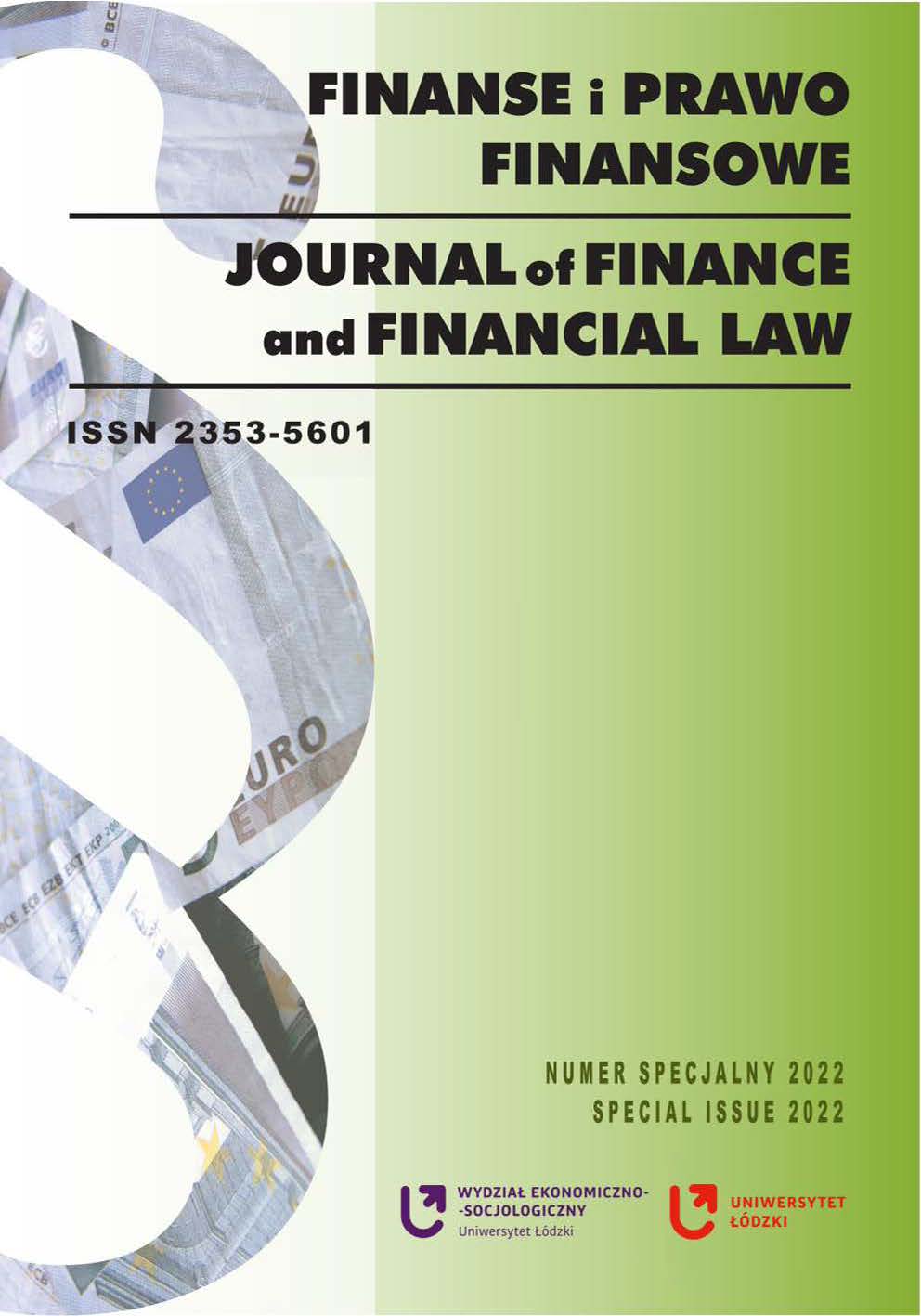Factors Explaining Tax Compliance
DOI:
https://doi.org/10.18778/2391-6478.S.2022.05Keywords:
tax administration, tax compliance, taxpayer behavior, public decision-making, public economy, theoretical reviewAbstract
The aim of the article: The aim is to examine factors explaining tax compliance identified in the Economy to design an efficient tax compliance system. Methodology: In order to achieve the formulated aim, the paper provides an economic literature review on tax compliance related to the efforts of governments to encourage taxpayer compliance while minimizing the cost of a tax administration’s activity. The paper presents a brief laying out the economics of tax evasion. Them, it focuses on critical summaries of what has been learned. Results of the research: The different factors identified indicate that tax compliance is a complex problem, with evident social costs and a significant impact on tax administration decisions. The tax compliance system minimizes the uncertainty and encourages the adoption of a series of voluntary mechanisms for cooperation between taxpayers and the tax administration.
Downloads
References
Alligham, M.G. and Sandmo, A. (1972). Income Tax Evasion: a Theoretical Analysis. Journal of Public Economics, I.
Google Scholar
DOI: https://doi.org/10.1016/0047-2727(72)90010-2
Alm, J., McKee, N. and Beck, M. (1990). Amazing grace: Tax amnesties and compliance. National Tax Journal, 43(1).
Google Scholar
DOI: https://doi.org/10.1086/NTJ41788822
Alm, J. and Malézieux, A. (2021). 40 years of tax evasion games: a meta-analysis. Experimental Economics, 24.
Google Scholar
DOI: https://doi.org/10.1007/s10683-020-09679-3
Alm, J., McCelland, G. and Schulze, W. (1992). Why do people pay taxes? Journal of Public Economics, 48.
Google Scholar
DOI: https://doi.org/10.1016/0047-2727(92)90040-M
Bayer, R. (2006). A contest with the taxman–the impact of rates of evasion and wastefully invested resources. European Economic Review, 50.
Google Scholar
DOI: https://doi.org/10.1016/j.euroecorev.2005.03.002
Bernasconi, M., Corazzini, L. and Seri, R. (2014). Reference dependent preferences, hedonic adaptation and tax evasion: Does the tax burden matter? Journal of Economic Psychology, 40.
Google Scholar
DOI: https://doi.org/10.1016/j.joep.2013.01.005
Boylan, S.J. and Sprinkle, G.B. (2001). Experimental evidence on the relation between tax rates and compliance: the effect of earned vs. endowed income. The Journal of American Taxation Association, 23.
Google Scholar
DOI: https://doi.org/10.2308/jata.2001.23.1.75
Caballé, J. and Panadés, J. (2003). Cost uncertainty and taxpayer compliance. International Tax and Public Finance, 12.
Google Scholar
DOI: https://doi.org/10.1007/s10797-005-0490-z
European Commission, 2016, Guidelines for a Model for a European Taxpayer’s Code, https://ec.europa.eu/taxation_customs/system/files/2016-11/guidelines_for_a_model_for_a_european_taxpayers_code_en.pdf
Google Scholar
Dahmi, S. and Al-Nowaihi, A. (2007). Why do people pay taxes: expected utility theory versus prospect theory. Journal of Economic Behavior & Organization, 64. http://dx.doi.org/10.1016/j.jebo.2006.08.006
Google Scholar
DOI: https://doi.org/10.1016/j.jebo.2006.08.006
Doerrenberg, P. and Duncan, D. (2014). Experimental evidence on the relationship between tax evasion opportunities and labour supply. European Economic Review, 68.
Google Scholar
DOI: https://doi.org/10.1016/j.euroecorev.2014.02.005
Gangl, K., Muehlbacher, S., de Groot, M., Goslinga, S., Hofmann, E., Kogler, C., Antonides, G. and Kirchler, E. (2013). How can I help you? Perceived Service Orientation of Tax Authorities and Tax Compliance. Public Finance Analysis, 694. http://dx.doi.org/10.1628/001522113X675683
Google Scholar
DOI: https://doi.org/10.2139/ssrn.2271574
Gordon, J. (1980). Individual Morality and Reputation Costs as Deterrents to Tax Evasion. European Economic Review, 33. http://dx.doi.org/10.1016/0014-2921(89)90026-3
Google Scholar
DOI: https://doi.org/10.1016/0014-2921(89)90026-3
Hashimzade, N., Myles, G.D., Page, F. and Rablen, M. (2014). Social Networks and Occupational Choice: The endogenous Formation of Attitudes and Beliefs About Tax Compliance. Journal of Economic Psychology, 40. http://dx.doi.org/10.1016/j.joep.2012.09.002
Google Scholar
DOI: https://doi.org/10.1016/j.joep.2012.09.002
Hashimzade, N., Myles, G.D. and Tran-Nam, B. (2013). Applications of Behavioural Economics to Tax Evasion. Journal of Economic Surveys, 275. http://dx.doi.org/10.1111/j.1467-6419.2012.00733.x
Google Scholar
DOI: https://doi.org/10.1111/j.1467-6419.2012.00733.x
Heinemann, F. and Kocher, M.G. (2013). Tax Compliance Under Tax Regime Changes. International Tax and Public Finance, 202. http://dx.doi.org/10.1007/s10797-012-9222-3
Google Scholar
DOI: https://doi.org/10.1007/s10797-012-9222-3
Kahneman, D. and Tversky, A. (1979). Prospect Theory: An Analysis of Decision Under Risk. Econometrica, 47. http://dx.doi.org/10.2307/1914185
Google Scholar
DOI: https://doi.org/10.2307/1914185
Kahneman, D. and Tversky, A. (1992). Advances in Prospect Theory: Cumulative Representation of Uncertainty. Journal of Risk and Uncertainty, 5.
Google Scholar
DOI: https://doi.org/10.1007/BF00122574
Kirchler, E., Muehlbacher, S., Hoelzl, E. and Webley, P. (2009). Effort and Aspirations in Tax Evasion, Experimental Evidence. Applied Psychology: An International Review, 583.
Google Scholar
DOI: https://doi.org/10.1111/j.1464-0597.2009.00403.x
Malézieux, A. (2018). A Practical Guide to Setting Up your Evasion Game. Journal of Tax Administration, 41.
Google Scholar
Mittone, L. (2006). Dynamic Behaviour in Tax Evasion: An Experimental Approach. The Journal of Socio-Economics, 35. http://dx.doi.org/10.1016/j.socec.2005.11.065
Google Scholar
DOI: https://doi.org/10.1016/j.socec.2005.11.065
Panadés i Martí, J. (2017). El análisis económico del cumplimiento fiscal en la imposición sobre la renta: una visión panorámica. Papeles de Economía Española, 154.
Google Scholar
Pareja García, B. (2018). El Tax Compliance y el cumplimiento tributario: nuevos retos empresariales. Revista de Derecho, Empresa y Sociedad REDS, 12.
Google Scholar
Rechberger, S., Hartner, M., Kirchler, E. and Hämmerle, F.K. (2010). Tax Amnesties, Justice Perceptions, and Filing Behavior: A Simulation Study. Law & Policy, 322. http://dx.doi.org/10.1111/j.1467-9930.2009.00316.x
Google Scholar
DOI: https://doi.org/10.1111/j.1467-9930.2009.00316.x
Schmidt, D. (2001). The Prospects of Taxpayer Agreement with Aggressive Tax Advice. Journal of Economic Psychology, 22. http://dx.doi.org/10.1016/S0167-4870(01)00027-7
Google Scholar
DOI: https://doi.org/10.1016/S0167-4870(01)00027-7
Slemrod, J. (2018). Tax Compliance and Enforcement. Working Paper 24799, National Bureau of Economic Research.
Google Scholar
DOI: https://doi.org/10.3386/w24799
Spicer, M.W. and Becker, L.A. (1980). Fiscal Inequity and Tax Evasion: An Experimental Approach. National Tax Journal, 33(2). http://dx.doi.org/10.1086/NTJ41862299
Google Scholar
DOI: https://doi.org/10.1086/NTJ41862299
Spicer, M.W. and Hero, R. (1985). Tax Evasion and Heuristics: A Research Note. Journal of Public Economics, 26.
Google Scholar
DOI: https://doi.org/10.1016/0047-2727(85)90009-X
Tax Justice Network 2020, The State of Tax Justice 2020. https://www.taxjustice.net/reports/the-state-of-tax-justice-2020/ [Accessed 10.11.2021].
Google Scholar
Torgler, B. and Schaltegger, C.A. (2005). Tax Amnesties and Political Participation. Public Finance Review, 33(3). https://journals.sagepub.com/doi/10.1177/1091142105275438
Google Scholar
DOI: https://doi.org/10.1177/1091142105275438
Yaniv, G. (1999). Tax compliance and advanced tax payments: a prospect theory analysis. National Tax Journal, 52.
Google Scholar
DOI: https://doi.org/10.1086/NTJ41789428
Yitzhaki, S. (1974). A note on income tax evasion: a theoretical analysis. Journal of Public Economics, 3.
Google Scholar
DOI: https://doi.org/10.1016/0047-2727(74)90037-1
Downloads
Published
How to Cite
Issue
Section
License

This work is licensed under a Creative Commons Attribution-NonCommercial-NoDerivatives 4.0 International License.














